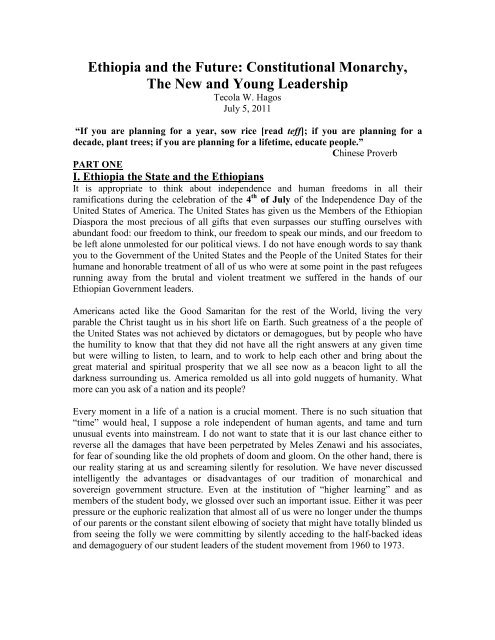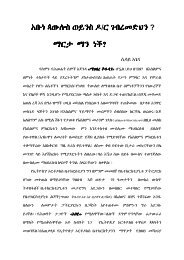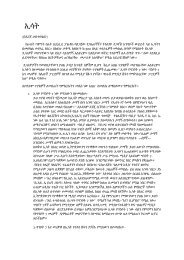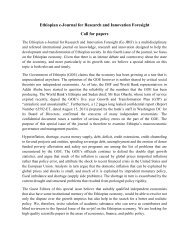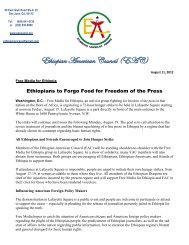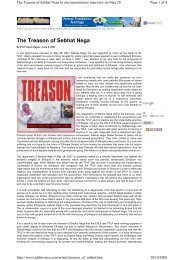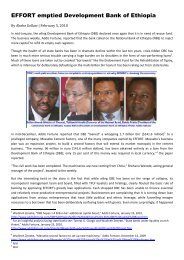Ethiopia and the Future - Ethiopia: A voice for the voiceless
Ethiopia and the Future - Ethiopia: A voice for the voiceless
Ethiopia and the Future - Ethiopia: A voice for the voiceless
You also want an ePaper? Increase the reach of your titles
YUMPU automatically turns print PDFs into web optimized ePapers that Google loves.
<strong>Ethiopia</strong> <strong>and</strong> <strong>the</strong> <strong>Future</strong>: Constitutional Monarchy,<br />
The New <strong>and</strong> Young Leadership<br />
Tecola W. Hagos<br />
July 5, 2011<br />
“If you are planning <strong>for</strong> a year, sow rice [read teff]; if you are planning <strong>for</strong> a<br />
decade, plant trees; if you are planning <strong>for</strong> a lifetime, educate people.”<br />
Chinese Proverb<br />
PART ONE<br />
I. <strong>Ethiopia</strong> <strong>the</strong> State <strong>and</strong> <strong>the</strong> <strong>Ethiopia</strong>ns<br />
It is appropriate to think about independence <strong>and</strong> human freedoms in all <strong>the</strong>ir<br />
ramifications during <strong>the</strong> celebration of <strong>the</strong> 4 th of July of <strong>the</strong> Independence Day of <strong>the</strong><br />
United States of America. The United States has given us <strong>the</strong> Members of <strong>the</strong> <strong>Ethiopia</strong>n<br />
Diaspora <strong>the</strong> most precious of all gifts that even surpasses our stuffing ourselves with<br />
abundant food: our freedom to think, our freedom to speak our minds, <strong>and</strong> our freedom to<br />
be left alone unmolested <strong>for</strong> our political views. I do not have enough words to say thank<br />
you to <strong>the</strong> Government of <strong>the</strong> United States <strong>and</strong> <strong>the</strong> People of <strong>the</strong> United States <strong>for</strong> <strong>the</strong>ir<br />
humane <strong>and</strong> honorable treatment of all of us who were at some point in <strong>the</strong> past refugees<br />
running away from <strong>the</strong> brutal <strong>and</strong> violent treatment we suffered in <strong>the</strong> h<strong>and</strong>s of our<br />
<strong>Ethiopia</strong>n Government leaders.<br />
Americans acted like <strong>the</strong> Good Samaritan <strong>for</strong> <strong>the</strong> rest of <strong>the</strong> World, living <strong>the</strong> very<br />
parable <strong>the</strong> Christ taught us in his short life on Earth. Such greatness of a <strong>the</strong> people of<br />
<strong>the</strong> United States was not achieved by dictators or demagogues, but by people who have<br />
<strong>the</strong> humility to know that that <strong>the</strong>y did not have all <strong>the</strong> right answers at any given time<br />
but were willing to listen, to learn, <strong>and</strong> to work to help each o<strong>the</strong>r <strong>and</strong> bring about <strong>the</strong><br />
great material <strong>and</strong> spiritual prosperity that we all see now as a beacon light to all <strong>the</strong><br />
darkness surrounding us. America remolded us all into gold nuggets of humanity. What<br />
more can you ask of a nation <strong>and</strong> its people?<br />
Every moment in a life of a nation is a crucial moment. There is no such situation that<br />
“time” would heal, I suppose a role independent of human agents, <strong>and</strong> tame <strong>and</strong> turn<br />
unusual events into mainstream. I do not want to state that it is our last chance ei<strong>the</strong>r to<br />
reverse all <strong>the</strong> damages that have been perpetrated by Meles Zenawi <strong>and</strong> his associates,<br />
<strong>for</strong> fear of sounding like <strong>the</strong> old prophets of doom <strong>and</strong> gloom. On <strong>the</strong> o<strong>the</strong>r h<strong>and</strong>, <strong>the</strong>re is<br />
our reality staring at us <strong>and</strong> screaming silently <strong>for</strong> resolution. We have never discussed<br />
intelligently <strong>the</strong> advantages or disadvantages of our tradition of monarchical <strong>and</strong><br />
sovereign government structure. Even at <strong>the</strong> institution of “higher learning” <strong>and</strong> as<br />
members of <strong>the</strong> student body, we glossed over such an important issue. Ei<strong>the</strong>r it was peer<br />
pressure or <strong>the</strong> euphoric realization that almost all of us were no longer under <strong>the</strong> thumps<br />
of our parents or <strong>the</strong> constant silent elbowing of society that might have totally blinded us<br />
from seeing <strong>the</strong> folly we were committing by silently acceding to <strong>the</strong> half-backed ideas<br />
<strong>and</strong> demagoguery of our student leaders of <strong>the</strong> student movement from 1960 to 1973.
2<br />
In fact, in my reflection of my own life-process, it has become abundantly clear to me<br />
how ill in<strong>for</strong>med <strong>and</strong> maladjusted most of us students <strong>and</strong> all of our student leaders were<br />
during that period. Contrary to few writers who try to convince us about <strong>the</strong> towering<br />
intelligence of our student leaders, <strong>the</strong> realty of our student-life of <strong>the</strong> period would<br />
reveal <strong>the</strong> mediocrity <strong>and</strong> utterly maladjusted life-style most students including <strong>the</strong><br />
student leaders were living during that era. Whe<strong>the</strong>r it is in <strong>the</strong> record of <strong>the</strong> writings of<br />
students in essays <strong>and</strong> articles of <strong>the</strong> time or even much later recantations <strong>and</strong> apologist<br />
polemics <strong>and</strong> rhetorical essays written by fully grown irresponsible adults, <strong>Ethiopia</strong>n<br />
student leaders were no scholars, or even good readers of available material. They were<br />
essentially charlatans in a dream world of <strong>the</strong>ir own figment of imagination. One good<br />
example of such maladjustment was <strong>the</strong> deep trench of semi urbanized student body that<br />
created unbridgeable barrier of least understood process of modernity distinct between<br />
<strong>the</strong> ordinary people of <strong>Ethiopia</strong> <strong>and</strong> <strong>the</strong>ir student children.<br />
It was totally absurd to discount a system that prevailed thous<strong>and</strong>s of years <strong>and</strong> remained<br />
in sovereign power in a neighborhood that was extremely hostile, just because some<br />
ersatz students quoting alien literature have admonished us in <strong>the</strong> most vulgar <strong>and</strong><br />
abominable manner to discard what was our best feature, <strong>for</strong> something that brought<br />
about <strong>the</strong> worst bloodshed in <strong>the</strong> history of <strong>Ethiopia</strong>. We must ask <strong>and</strong> find answers why<br />
we failed in our ef<strong>for</strong>t to modernize our country <strong>and</strong> to bring about a democratic<br />
government. From <strong>the</strong> time of <strong>the</strong> dissolution of <strong>the</strong> <strong>Ethiopia</strong>n Monarchy in 1975, what<br />
have we achieved in <strong>the</strong> thirty five years period since? What can be empirically shown is<br />
<strong>the</strong> fact that we have succeeded in bringing into power <strong>the</strong> worst human beings into<br />
power, such as Mengistu Haile Mariam, Meles Zenawi.<br />
Mengistu Hailemariam <strong>and</strong> <strong>the</strong> Derg members in totality were <strong>the</strong> very scum of society<br />
that brutalized, tortured, murdered tens of thous<strong>and</strong>s of innocent <strong>Ethiopia</strong>n youngsters,<br />
men <strong>and</strong> women, <strong>and</strong> not even sparing religious leaders. Mengistu skipped out of town in<br />
cowardly manner ab<strong>and</strong>oning his supporters when he lost his violent grip on <strong>Ethiopia</strong> due<br />
to <strong>the</strong> “liberation” guerilla insurrection by ethnic based narrow-minded <strong>Ethiopia</strong>-haters.<br />
Contrary to <strong>the</strong> lies <strong>and</strong> convoluted excuses offered by <strong>the</strong> leadership of <strong>the</strong> TPLF<br />
including those who were ei<strong>the</strong>r purged or left of <strong>the</strong>ir own accord, <strong>the</strong> fight against<br />
Mengistu was not a fight to just remove a brutal dictator but a fight aimed to destroy<br />
<strong>Ethiopia</strong> itself. Meles seems tenacious in hanging to his power, but he will end up his life<br />
of brutality like all dictators in utter humiliation <strong>and</strong> defeat.<br />
Have we liberated <strong>Ethiopia</strong> now since 1991? Far from any kind of healing or recovery,<br />
what we have now in <strong>Ethiopia</strong> is even worse especially when we consider our future<br />
prospects as a viable nation. It is true that <strong>the</strong> current Government of Meles Zenaw has<br />
not murdered or tortured, in absolute numbers as many <strong>Ethiopia</strong>ns as Mengistu <strong>and</strong> his<br />
government had done in <strong>the</strong> seventeen years of violent <strong>and</strong> murderous rule. However, <strong>the</strong><br />
looting of <strong>the</strong> wealth of <strong>Ethiopia</strong> (over eight billion dollars according to UN estimate),<br />
<strong>the</strong> destructive sectarian division of <strong>Ethiopia</strong> on <strong>the</strong> basis of ethnicity, <strong>the</strong> sale of huge<br />
tract of l<strong>and</strong> to <strong>for</strong>eign governments <strong>and</strong> individuals, <strong>the</strong> continuation of <strong>the</strong> denial of<br />
basic human rights, <strong>and</strong> <strong>the</strong> total disfranchisement of <strong>Ethiopia</strong>n farmers from owning<br />
<strong>the</strong>ir l<strong>and</strong>, et cetera makes <strong>the</strong> Government of Meles Zenawi <strong>and</strong> his supporters <strong>the</strong> worst
3<br />
government in our long history. Many individuals who were persecuted by Mengistu <strong>and</strong><br />
<strong>the</strong> Derg were disillusioned in supporting <strong>the</strong> TPLF <strong>and</strong> <strong>the</strong> leaders of <strong>the</strong> EPRDF;<br />
however, many have realized <strong>the</strong>ir errors <strong>and</strong> have become ardent supporters of <strong>the</strong><br />
Opposition.<br />
I will quote here once again my favorite great strategist, from thous<strong>and</strong>s of years ago <strong>and</strong><br />
from a different culture, whose wisdom still rings true: Sun Tzu because his words<br />
encapsulate our state of affairs in <strong>Ethiopia</strong>. In <strong>the</strong> words of Sun-Tzu, “Thus it is said that<br />
one who knows <strong>the</strong> enemy <strong>and</strong> knows himself will not be endangered in a hundred<br />
engagements. One who does not know <strong>the</strong> enemy but knows himself will sometimes be<br />
victories, sometimes meet with defeat. One who knows nei<strong>the</strong>r <strong>the</strong> enemy nor himself<br />
will invariably be defeated in every engagement.” [Sun-Tzu, The Art of War, Trans.<br />
Ralph D. Sawyer, (1994), 179]<br />
II. The attractive features of Constitutional Monarchy<br />
Since this article is a continuation of a discourse started by Prof Messay Kebede a few<br />
weeks back, I believe that I must make my self clearly understood on <strong>the</strong> substance of<br />
Messay’s article. My previous response was more on <strong>the</strong> issue of processes than <strong>the</strong><br />
content of his article per se. I do not support Messay on <strong>the</strong> issue or <strong>the</strong> idea of<br />
establishing “broad coalition” that would include <strong>the</strong> Government of Meles Zenawi <strong>and</strong><br />
<strong>the</strong> EPRDF each on its own (double dipping syndrome), if he goes beyond <strong>the</strong><br />
hypo<strong>the</strong>tical. I need to point out here that what I wrote a few weeks back supporting<br />
Messay Kebede was simply a support of his right to speak his mind <strong>and</strong> write freely, <strong>and</strong><br />
it was not a blank endorsement of all of his views. He had offered a series of ideas worth<br />
considering seriously, but it does not mean that I agree to a “coalition” or even in<strong>for</strong>mal<br />
dialogue with Meles Zenawi. I do not believe such coalition will work, its fate will be<br />
similar to <strong>the</strong> one attempted by Engineer Hailu Shawel prior to <strong>the</strong> 2005 Election. I did<br />
point that distinction at that time too. Especially, I was very critical of those individuals<br />
who attacked Messay in a personal manner outside of what I would expect to be<br />
acceptable discourse or dialogue.<br />
However, my dissatisfaction with <strong>the</strong> “coalition” route is not <strong>for</strong> <strong>the</strong> same reason given<br />
by Abiye <strong>and</strong> later Eskinder, <strong>for</strong> both commentators seem to have based <strong>the</strong>ir arguments<br />
on definitions. Moreover, Messay had continued to discuss <strong>the</strong> issue of engaging <strong>the</strong><br />
current <strong>Ethiopia</strong>n Government in a <strong>for</strong>m that is not clear to me. Ideally one must talk with<br />
one’s adversaries as long as <strong>the</strong>re is even a slim possibility of changing <strong>the</strong> course of our<br />
narration. Messay has offered o<strong>the</strong>r than that one point of “broad coalition” that brought<br />
about almost universal disagreement on <strong>the</strong> question of <strong>the</strong> democratic process. He also<br />
referred to Marx in a very important issue of <strong>the</strong> role of people <strong>and</strong> <strong>the</strong> power structure in<br />
society. In fur<strong>the</strong>ring <strong>and</strong> promoting our discourse, at a later date, I will show Marx<br />
irrelevance to our discourse <strong>and</strong> <strong>the</strong> sooner we drop referring to his work <strong>the</strong> better <strong>for</strong> us<br />
saving us sever confusion.<br />
A) The <strong>Ethiopia</strong>n Monarchy as a Symbol <strong>and</strong> Source of Morality <strong>and</strong> Ethics:<br />
We find in <strong>the</strong> earliest recorded history of mankind, in <strong>the</strong> writings of none o<strong>the</strong>r than<br />
<strong>the</strong> fa<strong>the</strong>r of history Herodotus that Greek Gods would travel to remote <strong>Ethiopia</strong> because
4<br />
<strong>the</strong>y preferred <strong>the</strong> company of <strong>Ethiopia</strong>ns than anyone else because of <strong>the</strong> high ethical<br />
st<strong>and</strong>ards of <strong>the</strong> "blameless <strong>Ethiopia</strong>ns." There is no o<strong>the</strong>r country in <strong>the</strong> history of <strong>the</strong><br />
world except <strong>Ethiopia</strong> that had about ten of its emperors or kings recognized as "Saints"<br />
or "Tsadikans" by a conservative religious organization or a Church or a people. In fact,<br />
in <strong>the</strong> case of Emperor Caleb (Ella Asbaha) (AD 514-540) what we have is a declared<br />
bona fide “Saint” <strong>for</strong> all three Christian Churches, including <strong>the</strong> Roman Catholic Church,<br />
a unique situation in <strong>the</strong> history of Christianity. It speaks to <strong>the</strong> great moral <strong>and</strong> ethical<br />
st<strong>and</strong>ard that <strong>Ethiopia</strong>n Monarchs adhered to through out our long history.<br />
1 - Emperor Ezana, reigned 319 -360 (who made Christianity <strong>the</strong> Official religion<br />
of Axum (<strong>Ethiopia</strong>)) (Saint)<br />
2 - Emperor Caleb (Ella Asbaha), reigned 528-540 (Saint)<br />
3 - Emperor Gebre Mesqel (sponsored St.Yared), reigned 541? Saint?<br />
4 - Emperor Yemrehana Christos, reigned 1039 – 1079 (Saint)<br />
5 - Emperor Harbe, reigned 1079 - 1119 (Saint)<br />
6 - Emperor Lalibela, reigned 1119 - 1159 (Saint)<br />
7 - Emperor Na’akuto Leab, reigned 1159 - 1207 (Saint)<br />
8 - Emperor Yitbarek, reigned 1207 - 1247 (Saint)<br />
9 - Emperor Ghelawdewos, reigned 1540-1559 (Saint) ?<br />
10 - Emperor Yohannes I, reigned 1667- 1682 (Tsdik/Saint)<br />
11 - Emperor Eyasu <strong>the</strong> Great, reigned 1682 – 1706 (Saint)<br />
I find it exhilarating to have such profoundly ethical leaders in our past where even<br />
hostile denominations found our leaders as great moral agents. This should not come as a<br />
surprise to us, <strong>for</strong> <strong>Ethiopia</strong>n Monarchs are chosen from <strong>the</strong> very best well trained<br />
scholarly aristocrats. If I had <strong>the</strong> time to research <strong>the</strong> history of <strong>Ethiopia</strong>n Moslem<br />
scholars <strong>and</strong> leaders, I probably would have found some such pious leaders comparable<br />
to our Christian “Saints.” A community of <strong>Ethiopia</strong>ns of what ever religious orientation<br />
would have that unique <strong>Ethiopia</strong>nness no matter how vehemently <strong>the</strong>y might try to reject<br />
<strong>the</strong> historic <strong>Ethiopia</strong>. It is beyond <strong>the</strong> scope of this essay to dwell on <strong>the</strong> contribution of<br />
Moslem <strong>Ethiopia</strong>ns, but in time I will find some pious religious leaders also in <strong>the</strong><br />
Moslem communities of <strong>Ethiopia</strong>.<br />
By contrast, my contemporary <strong>Ethiopia</strong>n leaders through whose administrations I lived<br />
through (Haile Selassie, Mengistu, <strong>and</strong> Meles Zenawi), despite <strong>the</strong>ir years of<br />
Governance, did not edify any degree of ethical st<strong>and</strong>ards that would have helped us<br />
maintain a society committed to human rights <strong>and</strong> democratic principles. Especially my<br />
generation seems to be <strong>the</strong> most ambitious <strong>and</strong> also <strong>the</strong> generation that screwed up<br />
<strong>Ethiopia</strong> <strong>the</strong> most. I have read recently some self congratulatory essays of self<br />
aggr<strong>and</strong>izement in chats <strong>and</strong> blogs. But those seem to be views based on feelings of guilt<br />
or frustrations of inadequacy. To applaud Endrias Eshete in any <strong>for</strong>m at this crucial<br />
moment during <strong>the</strong> life <strong>and</strong> death struggle of a people is <strong>the</strong> most callous disregard of <strong>the</strong><br />
record of his wasted talent <strong>and</strong> debauchery. Endrias is one of <strong>the</strong> main influences on <strong>the</strong><br />
leadership of <strong>the</strong> TPLF who legitimized ethnic federalism that continued to devastate<br />
<strong>Ethiopia</strong> to this day.
5<br />
By mistake, I used to blame Prof Samuel P. Huntington of Harvard <strong>for</strong> <strong>the</strong> destructive<br />
implementation of ethnic federalism in <strong>Ethiopia</strong>, when <strong>the</strong> real culprits were Endrias <strong>and</strong><br />
his fellow graduates from Yale, such as Fasil Nahum who silenced o<strong>the</strong>r <strong>voice</strong>s from<br />
being heard <strong>and</strong> gave Meles Zenawi <strong>the</strong> type boost that totally dominated <strong>the</strong> o<strong>the</strong>r TPLF<br />
Leaders. All kinds of horrendous crimes have been committed by Meles Zenawi <strong>and</strong> his<br />
group. And Endrias Eshete is still part <strong>and</strong> parcel of <strong>the</strong> criminal gang surrounding Meles<br />
Zenawi whose crimes from murder to money laundering, steeling <strong>the</strong> national wealth<br />
directly or through surrogates like Mohamed Al Amoudi <strong>and</strong> o<strong>the</strong>rs is an open secret. To<br />
some extent, I feel some relief <strong>for</strong> I did apologize <strong>for</strong> my errors to Huntington <strong>the</strong> great<br />
political scientist be<strong>for</strong>e he died in 2008.<br />
B) The <strong>Ethiopia</strong>n Monarchy as <strong>the</strong> Source <strong>and</strong> Symbol of Justice<br />
Do we underst<strong>and</strong> <strong>the</strong> significance of <strong>the</strong> depth of moral <strong>and</strong> ethical nuances that go into<br />
<strong>the</strong> making of a “saint”? I searched <strong>the</strong> history of religion, <strong>and</strong> in particular that of <strong>the</strong><br />
many Christian Churches, <strong>and</strong> <strong>the</strong>re was nothing that I could compare with <strong>the</strong> <strong>Ethiopia</strong>n<br />
Monarchs. Closer to our own contemporary history in <strong>the</strong> Eighteenth Century Emperor<br />
Yohannes I AD 1667-1682, is reported to have condemned his own son to death <strong>for</strong><br />
murdering a poor widow’s only son, in what <strong>the</strong> great Emperor considered a callous<br />
disregard of <strong>the</strong> respect due to a human life. Justice is what <strong>Ethiopia</strong>ns want from <strong>the</strong>ir<br />
Emperor, <strong>and</strong> <strong>the</strong> <strong>Ethiopia</strong>n Emperors were ever mindful of <strong>the</strong>ir public acts as well as<br />
<strong>the</strong>ir private lives, whereby <strong>the</strong> <strong>Ethiopia</strong>n Church, <strong>the</strong>ir Lords <strong>and</strong> <strong>the</strong>ir own family<br />
members had great sway in <strong>the</strong> way <strong>the</strong>y conducted <strong>the</strong>mselves.<br />
For Example an early traveler, a physician from France, wrote his impression of Eyasu<br />
<strong>the</strong> Great thus: “The Emperor has great qualities—a quick <strong>and</strong> piercing wit [i.e.<br />
intelligence], a sweet <strong>and</strong> affable humor, <strong>and</strong> <strong>the</strong> stature of a hero. He is <strong>the</strong> h<strong>and</strong>somest<br />
man I have seen in Aethiopia. He is a lover of curious arts <strong>and</strong> sciences; but his chief<br />
passion is <strong>for</strong> war. He is brave <strong>and</strong> undaunted in battles, <strong>and</strong> always at <strong>the</strong> head of his<br />
troops. He has an extraordinary love <strong>for</strong> justice, which he administers to his subjects with<br />
great exactness; but whereas he is averse to blood, 'tis not without reluctance that he<br />
condemns a criminal [to death]. Such eminent qualities make him equally feared <strong>and</strong><br />
beloved by his subjects, who respect him even to adoration.” Charles Jacques Poncet, The<br />
Red Sea <strong>and</strong> Adjacent Countries, William Foster, editor (London: Hakluyt Society,<br />
1949), pp. 130f.<br />
The comment of Cardinal Paulos Tzedue, <strong>the</strong> highly learned <strong>and</strong> superbly gifted<br />
<strong>Ethiopia</strong>n Catholic Church Fa<strong>the</strong>r, translator of <strong>the</strong> Fetha Negest into English, makes it<br />
clear how <strong>Ethiopia</strong> was connected to <strong>the</strong> outside world not only in trade but in <strong>the</strong> flow of<br />
ideas, “The [Fetha Negest] (‘The Law of <strong>the</strong> Kings’) is a book of law that has been in use<br />
in Christian <strong>Ethiopia</strong> since at least <strong>the</strong> l6th Century. In spite of its being an object of<br />
considerable pride <strong>and</strong> veneration by <strong>Ethiopia</strong>ns, it is not an original <strong>Ethiopia</strong>n<br />
composition, <strong>for</strong> it is ra<strong>the</strong>r derived from an Arabic work known as Magˇmu¯ alqawa¯nı¯n,<br />
(‘Collection of Canons’), written in <strong>the</strong> year 1238 by <strong>the</strong> Christian Egyptian<br />
Jurist Abu¯ l-Fad.a¯’il Ibn al‘Assa¯l as-S. afı¯, a contemporary of Patriarch Cyril III of<br />
Alex<strong>and</strong>ria (1235–43).” The Fetha Negest is part record of cases decided by generations<br />
of Emperors <strong>and</strong> Kings <strong>and</strong> also part codification of principles of law both Penal <strong>and</strong>
6<br />
Civil. In <strong>the</strong> later case it is held that it was a translation of an Egyptian original legal<br />
codification in <strong>the</strong> 16 th Century.<br />
In contrast to <strong>the</strong> pious <strong>Ethiopia</strong>n leaders, <strong>the</strong> debauchery of <strong>the</strong> Sultans, <strong>the</strong> Caliphs, <strong>the</strong><br />
Roman Emperors or those of <strong>the</strong> Emperors <strong>and</strong> Kings of <strong>the</strong> Far East <strong>and</strong> China, is a clear<br />
reminder to all of us about <strong>the</strong> ethical strength of <strong>Ethiopia</strong>n leaders. Especially when we<br />
consider <strong>the</strong> tens of thous<strong>and</strong>s of young ladies kept in <strong>the</strong> harems, <strong>the</strong> tens of thous<strong>and</strong><br />
who perished in <strong>the</strong> dungeons <strong>and</strong> torture chambers, <strong>the</strong> millions in concentration camps<br />
compared to <strong>the</strong> minuscule misdeeds of <strong>Ethiopia</strong>n Monarchs. <strong>Ethiopia</strong>n Monarchs<br />
without exception were all highly trained, very literate individuals; in fact, a great many<br />
of <strong>the</strong>m were destined to live out <strong>the</strong>ir lives as priests, church scholars <strong>and</strong> teachers<br />
be<strong>for</strong>e <strong>the</strong>y were chosen to be Kings <strong>and</strong> Emperors.<br />
C) The <strong>Ethiopia</strong>n Monarchy as a Symbol of Unity <strong>and</strong> as a Unifying Force<br />
At this juncture of our ever complicated modern history, what <strong>Ethiopia</strong> needs most is<br />
unity <strong>and</strong> rein<strong>for</strong>cement of its sovereignty <strong>and</strong> territorial integrity. Meles Zenawi in <strong>the</strong><br />
last twenty years has succeeded in fracturing <strong>and</strong> weakening <strong>the</strong> State structure of<br />
<strong>Ethiopia</strong>. He is now poised to deliver <strong>the</strong> coup d’grace by <strong>the</strong> declaration of <strong>the</strong><br />
independence of Tigray <strong>and</strong> leaving total civil war in <strong>the</strong> rest of <strong>Ethiopia</strong>. I am making<br />
this accusation after serious consideration of <strong>the</strong> policy followed by <strong>the</strong> Government of<br />
Meles Zenawi, his official pronouncements <strong>and</strong> speeches in <strong>the</strong> House of<br />
Representatives, <strong>and</strong> <strong>the</strong> extensive interviews he has been giving since over a period of<br />
ten years. I am not one iota interested in Meles Zenawi as an individual in his private life.<br />
My interest is all about his devastation of my/our godly Country: <strong>Ethiopia</strong> <strong>and</strong> <strong>the</strong><br />
<strong>Ethiopia</strong>n people in all <strong>the</strong>ir variation <strong>and</strong> linguistics.<br />
In o<strong>the</strong>r words, most <strong>Ethiopia</strong>n Emperors were not involved in debauchery, over<br />
indulgence, sadistic deviant behavior like those of <strong>the</strong>ir contemporaries in <strong>the</strong> Arab<br />
world, Asia, Europe, or <strong>the</strong> Americas. Consider <strong>the</strong> degree of abuse of women in Palaces<br />
of <strong>the</strong> Ottoman Sultans, in <strong>the</strong> palaces of <strong>the</strong> Caliphs in Damascus, Baghdad et cetera; in<br />
<strong>the</strong> Courts of <strong>the</strong> English Kings where even queens were not spared barbaric<br />
punishments. Consider <strong>the</strong> period of religious persecutions all over Europe, <strong>the</strong> Spanish<br />
inquisitions <strong>and</strong> o<strong>the</strong>r Papal sanctioned barbarity where hundreds of thous<strong>and</strong>s were<br />
burned at <strong>the</strong> stake. And millions of Africans <strong>and</strong> indigenous people were victims of<br />
harrowing brutal slavery practiced by European settler population in <strong>the</strong> Americas <strong>for</strong><br />
over four hundred years. By comparison most of our Church leaders <strong>and</strong> Emperors were<br />
exceptionally ethical <strong>and</strong> principled people. They were not greedy materialist despots<br />
ei<strong>the</strong>r. Their great Imperial <strong>and</strong> religious power was tempered because of <strong>the</strong>ir genuine<br />
religious devotion <strong>and</strong> <strong>the</strong>ir Christian upbringing. They had great virtues that we need to<br />
remember <strong>and</strong> base our communal life on. [Tecola W. Hagos, “Paradigm of Poverty <strong>and</strong><br />
Humanism: Undoing <strong>Ethiopia</strong>’s Modernity,” www.tecolahagos.com, July 25, 2003.]<br />
It would be utter madness to see our modern leaders including Mengistu Hailemariam<br />
<strong>and</strong> Meles Zenawi in <strong>the</strong> same light as our illustrious Monarchs who ruled <strong>Ethiopia</strong> <strong>for</strong><br />
thous<strong>and</strong>s of years. Who would in his right mind compare Amede Tsion or Eyasu <strong>the</strong><br />
Great with minions like Meles <strong>and</strong> Mengistu? It is to be recalled from our early history
7<br />
that some marauding Bejas coming out of <strong>the</strong> area now in <strong>the</strong> Sudan, <strong>and</strong> some Somali<br />
tribal invaders were defeated repeatedly a couple of centuries be<strong>for</strong>e Gragn’s destructive<br />
war against <strong>Ethiopia</strong>, in devastating battles by Amde Tsion, <strong>the</strong> greatest warrior Emperor<br />
of <strong>Ethiopia</strong> who spent almost all of his thirty years of reign (1307-1336) on horse-back<br />
on battle fields <strong>and</strong> campaign routes. His campaign was against destructive <strong>for</strong>ces,<br />
marauders <strong>and</strong> scavengers of settled civilizations, <strong>and</strong> slavers of human beings, who<br />
destroyed families <strong>and</strong> devastated <strong>the</strong> hinterl<strong>and</strong>s of Sub Saharan Africa <strong>and</strong> <strong>the</strong> coastal<br />
hinterl<strong>and</strong> of present day Kenya, parts of Sou<strong>the</strong>rn <strong>Ethiopia</strong>, <strong>the</strong> present day Ug<strong>and</strong>a,<br />
Tanzania, Mozambique et cetera <strong>and</strong> have continued <strong>the</strong>ir raids <strong>and</strong> looting into <strong>the</strong><br />
Modern era. They are <strong>the</strong> same people who later cooperated with <strong>the</strong> Egyptians, <strong>the</strong><br />
Turks, <strong>and</strong> even <strong>the</strong> British <strong>and</strong> Italians in <strong>the</strong> Nineteenth <strong>and</strong> Twentieth Centuries <strong>and</strong><br />
were instrumental as beachheads <strong>for</strong> African colonialism. <strong>Ethiopia</strong>n Emperors mainly<br />
fought in defense of <strong>the</strong> Christian settled subjects <strong>and</strong> against marauders <strong>and</strong> slavers in<br />
both nor<strong>the</strong>rn <strong>and</strong> sou<strong>the</strong>rn <strong>Ethiopia</strong>. The earliest record is that of Emperor Ezana in AD<br />
340 on a stone monument to his victory <strong>and</strong> resettlement of over five thous<strong>and</strong> Bejas in<br />
<strong>the</strong> Begameder.<br />
There is no doubt that <strong>Ethiopia</strong>n Emperors were true scholars <strong>and</strong> warrior leaders. They<br />
were also symbols of Unity <strong>and</strong> of a Sovereign People. Their bravery in battles <strong>and</strong> <strong>the</strong>ir<br />
magnanimity in <strong>the</strong>ir treatment of <strong>the</strong>ir subjects were truly note worthy. Unlike Mengistu<br />
<strong>and</strong> Meles, <strong>the</strong>y were not armchair comm<strong>and</strong>ers, but actually led military expeditions <strong>and</strong><br />
fought in real battles risking <strong>the</strong>ir lives <strong>and</strong> a few of <strong>the</strong>m died in battle fields with great<br />
courage. In addition, almost all of <strong>Ethiopia</strong>’s Emperors were great scholars <strong>and</strong><br />
intellectuals trained from <strong>the</strong>ir childhood in <strong>the</strong> history of <strong>the</strong>ir people <strong>and</strong> <strong>the</strong>ir faith. It is<br />
a fact that some of <strong>the</strong> great books of philosophy <strong>and</strong> <strong>the</strong>ology were ei<strong>the</strong>r written or<br />
sponsored by <strong>Ethiopia</strong>n Emperors. As stated above, <strong>Ethiopia</strong>n Emperors were highly<br />
learned warrior leaders. No comparison can be made with our current whimsical leaders<br />
who will not even venture out <strong>for</strong> a stroll unless <strong>the</strong> entire community is <strong>for</strong>ced into a<br />
st<strong>and</strong>still with a security bubble created to contain <strong>the</strong>m that surpasses that of <strong>the</strong> security<br />
arrangement of <strong>the</strong> President of <strong>the</strong> United States..<br />
D) The <strong>Ethiopia</strong>n Monarchy as Defender of <strong>the</strong> Faith <strong>and</strong> Symbol of God’s Grace<br />
Emperor Gebre Meskel was <strong>the</strong> patron of Yared <strong>the</strong> greatest Church music composer.<br />
The last of <strong>the</strong> Great Zagwe Dynasty, Emperor Harbe’I (?) gave up his sovereignty on his<br />
own peacefully to Yukuno Amlake (1263-1277) <strong>the</strong> “rightful” Heir to <strong>the</strong> <strong>Ethiopia</strong>n<br />
Throne in 1263 on <strong>the</strong> advice of Abuna Teklehaimanot, a revered religious leader.<br />
Emperors Dawit I (1374-1406) <strong>and</strong> Yeshaq (1406-1421) were patrons of Aba Giorgis<br />
ZeGascha, author of over ten great <strong>the</strong>ological books; Emperor Zer’a Yacob (1426-1460)<br />
was a prolific author of numerous <strong>the</strong>ological <strong>and</strong> philosophical books; Emperor Skunder<br />
(1471-1487) wrote Melkae Mariam. Some Emperors were independent thinkers even<br />
going against <strong>the</strong> grain, such as Emperor ZeDengil (1596-97) a philosopher <strong>and</strong> great<br />
scholar who converted to Catholicism that coasted him his life, <strong>and</strong> Emperor Susenyous<br />
(1600-1625) who was <strong>for</strong>ced to abdicate in favor of his conservative son, Fasiladas,<br />
because Susenyous converted to Catholicism.
8<br />
Gragn Mohammed devastated <strong>Ethiopia</strong>; regrettably, destroying in a mere twelve years<br />
[1523-1535] most of <strong>the</strong> great Churches <strong>and</strong> Ca<strong>the</strong>drals (Debers) <strong>and</strong> <strong>the</strong>ir great libraries<br />
depository of knowledge that took over a thous<strong>and</strong> year to accumulate. [It was during that<br />
time that most of <strong>the</strong> <strong>for</strong>ced conversion of Christian <strong>Ethiopia</strong>ns to Islam took place. It<br />
was also during that period <strong>and</strong> soon after that Oromos from <strong>the</strong> South near <strong>the</strong> present<br />
day Kenyan border moved to most of <strong>the</strong> present day areas designated as Oromo region<br />
by <strong>the</strong> current government of <strong>Ethiopia</strong>. In most of <strong>the</strong>se areas we can find earlier<br />
Christian settlements of remnants of Churches <strong>and</strong> villages.] I could say <strong>the</strong> number of<br />
books destroyed was no less in importance than <strong>the</strong> burning of <strong>the</strong> great Library of<br />
Alex<strong>and</strong>ria in 48 BC or <strong>the</strong> systematic destruction of all <strong>the</strong> great libraries <strong>and</strong> centers of<br />
learning in Alex<strong>and</strong>ria by Arab Moslem religious fanatics in AD 642.<br />
The wanton destruction of <strong>Ethiopia</strong>’s great Churches, centers of learning, <strong>and</strong> libraries by<br />
Gragn is characteristic of Arabs’ religion based destructive campaign throughout <strong>the</strong> ages<br />
in Asia <strong>and</strong> Africa. Of course, at <strong>the</strong> time of Gragn, <strong>the</strong> Ottoman turks were in control of<br />
<strong>the</strong> Arab World, <strong>and</strong> Gragn was <strong>the</strong>ir spearhead aimed at <strong>the</strong> heart of Christian <strong>Ethiopia</strong>.<br />
<strong>Ethiopia</strong> has not yet recovered fully from that destruction. By contrast <strong>Ethiopia</strong>n leaders<br />
were considerate of <strong>the</strong>ir actions as evidenced by <strong>the</strong> inscription on a stone monument<br />
left by Ezana about <strong>the</strong> conquest of Beja tribes. And all <strong>the</strong> way to <strong>the</strong> time of <strong>the</strong> rein of<br />
Emperor Menilik in <strong>the</strong> 19th Century, <strong>Ethiopia</strong>n leaders were some of <strong>the</strong> most well<br />
in<strong>for</strong>med <strong>and</strong> well trained leaders that ever walked this Earth.<br />
As stated above some <strong>Ethiopia</strong>n Emperors were genuinely religious people who would go<br />
to <strong>the</strong> extent of giving up <strong>the</strong>ir Empire or <strong>the</strong>ir lives <strong>for</strong> <strong>the</strong> salvation of <strong>the</strong>ir souls <strong>and</strong> <strong>for</strong><br />
<strong>the</strong> glory of God. Emperor Galawdewos (1533-1551) on <strong>the</strong> eve of his last battle was<br />
in<strong>for</strong>med by a “holy-man” that if he fought <strong>the</strong> next day he will die <strong>and</strong> will attain<br />
martyrdom <strong>and</strong> Heaven, but if he runs away, he will live to be an old man but would not<br />
enter Heaven. He chose to fight <strong>the</strong> next day, <strong>and</strong> died in battle believing he will save his<br />
soul from damnation. Ano<strong>the</strong>r example of <strong>the</strong> religious fervor of <strong>Ethiopia</strong>n leaders is best<br />
illustrated by Emperor Eyasu (1674-1698) who voluntarily gave up his Reign <strong>and</strong> became<br />
a monk. Emperor Yohannes IV became a monk on <strong>the</strong> same day he was crowned<br />
Emperor. Even our last Emperor, Haile Selassie I, whom I have at times overly maligned<br />
in articles, which I regret, was a “holy-man” compared to his contemporaries in <strong>the</strong> rest<br />
of <strong>the</strong> world; he had great self discipline, spiritual strength, <strong>and</strong> moral principles.<br />
One must not <strong>for</strong>get <strong>the</strong> fact that <strong>Ethiopia</strong> is because of <strong>the</strong> <strong>Ethiopia</strong>n Orthodox Church,<br />
not because of <strong>the</strong> singular ef<strong>for</strong>ts of its warriors or its emperors—not that <strong>the</strong>y did not<br />
contribute greatly to our long history of independence <strong>and</strong> freedom, but without <strong>the</strong><br />
Church <strong>the</strong>y would have been lost sheep. No o<strong>the</strong>r religious institution in <strong>the</strong> world has<br />
withstood <strong>the</strong> ravages of colonialism, racism, ethnicism, fanaticism as did <strong>the</strong> <strong>Ethiopia</strong>n<br />
Orthodox Church, <strong>and</strong> saved its members as well as all who came under its<br />
responsibilities since its establishment in AD 340. It has served us all more than any<br />
institution that ever graced our nation by preserving our humanity, our sense of freedom<br />
<strong>and</strong> justice, our concept of individual responsibility as opposed to guilt by association.<br />
The fact of <strong>the</strong> matter is that if it were not <strong>for</strong> this great Church we would have shrouded<br />
our females in garments of oppression, unleashed some of <strong>the</strong> most barbaric <strong>for</strong>ms of
9<br />
punishment on our people, <strong>and</strong> would have turned our nation into a l<strong>and</strong> of blood shed<br />
<strong>and</strong> fanaticism. With any o<strong>the</strong>r ethical, moral, or spiritual center, <strong>the</strong>re would have been<br />
no <strong>Ethiopia</strong>—we all would have been marginalized, banished to some fractured tiny<br />
enclaves of colonial fragments of communities of slaves <strong>and</strong> house attendants licking <strong>the</strong><br />
boots of European or Arab masters.<br />
Conclusion<br />
I am not offering <strong>the</strong> above examples of <strong>the</strong> courage, ethics, <strong>and</strong> scholarship of <strong>Ethiopia</strong>n<br />
Emperors with <strong>the</strong> hope of restoring <strong>Ethiopia</strong>’s monarchy or aristocracy as a political<br />
power. I wrote thus some eight years ago about that fact. The <strong>Ethiopia</strong>n aristocracy [as<br />
apolitical power] has limited credibility or future in <strong>the</strong> present day <strong>Ethiopia</strong>. It has<br />
become <strong>the</strong> ash after a great bonfire. It is gone, <strong>and</strong> we are venturing out into a new era.<br />
The sooner <strong>the</strong> few die-hard monarchists realize that <strong>the</strong> better <strong>for</strong> all of us. However,<br />
that is not <strong>the</strong> end of <strong>the</strong> story <strong>for</strong> <strong>the</strong> <strong>Ethiopia</strong>n Monarchy. I see a great role that <strong>the</strong>y will<br />
be called upon to play to hold <strong>Ethiopia</strong> toge<strong>the</strong>r through <strong>the</strong>ir symbolic reality. We need<br />
our past in order to build our future. Thus, <strong>the</strong> members of <strong>the</strong> aristocracy <strong>and</strong> <strong>the</strong>ir<br />
supporters have a new role to play in <strong>the</strong> new <strong>Ethiopia</strong>, <strong>for</strong> <strong>the</strong> resurrection of <strong>the</strong> spirit of<br />
our glorious past <strong>and</strong> <strong>the</strong> building of our self-confidence is in <strong>the</strong>ir h<strong>and</strong>s. Their role that I<br />
am advocating <strong>for</strong> is not <strong>for</strong> political power, but a unifying symbolic power to be<br />
enshrined in a Constitution. I am calling <strong>for</strong> <strong>the</strong> establishment of a constitutional<br />
monarchy. The detail of <strong>the</strong> structure of such institution will be worked out after an open<br />
discourse. As part of that discourse I have offered my views in this article <strong>and</strong> earlier<br />
articles that were also incorporated here.<br />
Most importantly, one may say that it is in <strong>the</strong> Nineteenth Century that <strong>the</strong> need <strong>for</strong> close<br />
contact with Europeans was <strong>for</strong>ced on <strong>Ethiopia</strong> due to <strong>the</strong> scramble <strong>for</strong> Africa by<br />
European powers. The French, <strong>the</strong> British, <strong>and</strong> <strong>the</strong> Italians to a different degree were all<br />
involved in <strong>the</strong> occupation of <strong>Ethiopia</strong>n territory. The most blatant was <strong>the</strong> Italian<br />
occupation of <strong>the</strong> seat of <strong>the</strong> <strong>Ethiopia</strong>n government in 1935-41. For <strong>Ethiopia</strong>n Emperors<br />
it became very clear that a new military armament was necessary to defend <strong>and</strong> preserve<br />
<strong>the</strong> integrity of <strong>Ethiopia</strong>. The old weapons of sword, spear, <strong>and</strong> shield, no matter how<br />
courageously welded, were no match to guns <strong>and</strong> cannons. In such noble act of self<br />
defense <strong>Ethiopia</strong> fought back a well armed Italian military in 1886 totally annihilating it.<br />
There were several o<strong>the</strong>r ef<strong>for</strong>ts by Egypt to annex <strong>Ethiopia</strong>n territory in order to acquire<br />
a beachhead close to <strong>the</strong> source of <strong>the</strong> Blue Nile. One may say that <strong>the</strong> moving factor <strong>for</strong><br />
modernization in <strong>Ethiopia</strong> was <strong>the</strong> search <strong>for</strong> guns <strong>and</strong> cannons.<br />
It is possible <strong>and</strong> appropriate to make some distinctions between concepts of civilization,<br />
modernization, <strong>and</strong> westernization. It might even be desirable to make that distinction <strong>for</strong><br />
a country such as <strong>Ethiopia</strong> with thous<strong>and</strong>s of years of civilization. This distinction can be<br />
observed <strong>and</strong> properly appreciated <strong>the</strong> way some Far Eastern countries like Singapore,<br />
Malaysia, Hong Kong, even Japan are modernized without becoming westernized. In fact<br />
one can say that where Westernization is successfully applied to a community with strong<br />
<strong>and</strong> ancient civilization, <strong>the</strong> result is modernization, a kind of a syn<strong>the</strong>sis. Whereas, when<br />
westernization is <strong>for</strong>ced on a community with rudimentary “modern” institutions or on a<br />
community at primitive economic depraved developmental stage, <strong>the</strong> effect is
10<br />
devastating. Such <strong>for</strong>m of whole-sale westernization may result in a hayride that will not<br />
bear fruit. A case in point is our inept <strong>and</strong> toothless intelligentsia that had totally<br />
recounted its <strong>Ethiopia</strong>n cultural heritage except in a very superficial manner, mainly its<br />
affinity <strong>for</strong> Kitfo <strong>and</strong> <strong>the</strong> like. Ω<br />
Tecola Worq Hagos<br />
Washington DC<br />
July 4, 2011<br />
NB: Some of <strong>the</strong> ideas in this article are incorporated from my earlier writing dating back<br />
to 2003. TH<br />
To be continued<br />
PART TWO<br />
The Destructive Forces: 1) Marxism <strong>and</strong> Leninism <strong>and</strong> <strong>the</strong> <strong>Ethiopia</strong>n Student<br />
Movement, 2) The Military Derg, <strong>and</strong> <strong>the</strong> TPLF (EPRDF) <strong>and</strong> EPLF<br />
PART THREE<br />
The New Leadership <strong>and</strong> Constitutional Monarchy of <strong>Ethiopia</strong>


